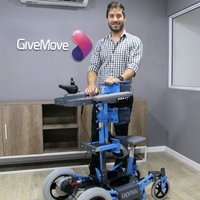Biotechnology & medicine
Jiawen Li
Engineering a tiny device to help cardiologists with a common problem.

Japan
Noriko Endo
Advancing the implementation of wastewater surveillance to improve public health surveillance for COVID-19 and beyond.

Europe
Peter Rowe
Co-Founder, Deep Branch

Europe
Flávia Sousa
CEO, LYRIS

Latin America
Alejandro Bisi
Using technology to give more independence to children with motor disabilities through motorized standing frames.
